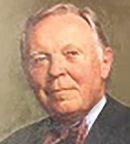
Albert H. Owens, Jr, MD Photo © Johns Hopkins Medicine
Albert H. Owens, Jr, MD, a Johns Hopkins oncologist who played a leadership role in developing oncology as a scientific discipline and clinical specialty—and who also served as President of The Johns Hopkins Hospital—died January 13 at the age of 90.
In the 1960s, oncology was not a word that existed in the medical lexicon. Few specific medical facilities were set aside for cancer care, and there was no clearly recognized academic discipline. Dr. Owens, a 1949 graduate of the Johns Hopkins University School of Medicine and a member of its faculty since 1956, set about devoting his career to advancing cancer research and treatment.
Al Owens, a founder of the field of medical oncology, built one of the nation’s great cancer centers. Al should receive a great deal of the credit for what cancer care and research have become today.— William G. Nelson, MD, PhD
Tweet this quote
“Al Owens, a founder of the field of medical oncology, built one of the nation’s great cancer centers. Al should receive a great deal of the credit for what cancer care and research have become today,” said William G. Nelson, MD, PhD, Director of the Johns Hopkins Kimmel Cancer Center.
Distinguished History
In 1957, A. McGehee Harvey—then head of the Johns Hopkins University School of Medicine’s Department of Medicine—created a cancer research and treatment division within the department, noting that chemotherapy had recently joined radiotherapy and surgery as weapons in the battle against cancer. Mr. Harvey tapped Dr. Owens to head the new oncology division. Because at that time The Johns Hopkins Hospital lacked the space for such a service, Dr. Owens moved inpatient, clinical, and research oncology activities to Baltimore City Hospitals, now known as Johns Hopkins Bayview Medical Center. Dr. Owens opened Johns Hopkins’ first cancer chemotherapy unit at Baltimore City Hospitals in 1961, making it one of the first university-based centers of its kind.
In 1973, Dr. Owens—a slightly bashful, bow tie–wearing researcher and clinician—was named the first Director of the Johns Hopkins Oncology Center, which had won federal designation as one of the nation’s first comprehensive cancer centers. In 1977, Dr. Owens moved the center from Baltimore City Hospitals back to the main campus of The Johns Hopkins Hospital, where it was housed in a brand-new facility, named the Oncology Center. Over the next decade, the Johns Hopkins Oncology Center became one of the most prestigious cancer centers in the country and is now named the Sidney Kimmel Comprehensive Cancer Center at Johns Hopkins.
Dr. Owens was named President of The Johns Hopkins Hospital in 1987. Eighteen months later, he opted to relinquish the presidency to focus on developing the hospital’s new multimillion-dollar oncology center. Despite his brief tenure in the top job, the month he left, he decreed that the hospital would become smoke-free.
The Harry and Jeanette Weinberg Building was completed in January 2000. It was soon followed by the opening of the Bunting Family and Jacob and Hilda Blaustein Family Cancer Research Building. In 2006, the David H. Koch Cancer Research Building opened. The latter two research buildings are connected by an auditorium named in Dr. Owens’ honor.
In addition to his positions at Johns Hopkins, Dr. Owens also served as President of the Maryland division of the American Cancer Society, President of the Association of American Cancer Institutes, and President of ASCO.
Tributes From Colleagues
“Al was an exceptional leader who believed that the best way to foster science that would improve patient outcomes was to put basic scientists and clinicians into the same building so they would naturally bond as team members, sharing projects, discoveries, frustrations, and coffee on a daily basis,” said Stuart A. Grossman, MD, Professor of Oncology, Medicine, and Neurosurgery at the Johns Hopkins University School of Medicine. “He radiated interest and enthusiasm when it came to cancer research and frequently dropped unannounced into the offices of young faculty members, asking them to describe the most exciting research project they were working on that day.”
“Dr. Owens was not only a superb oncologist and mentor, but a first-rate gentleman,” revealed David Ettinger, MD, Alex Grass Professor of Oncology at the Johns Hopkins University School of Medicine. ■

